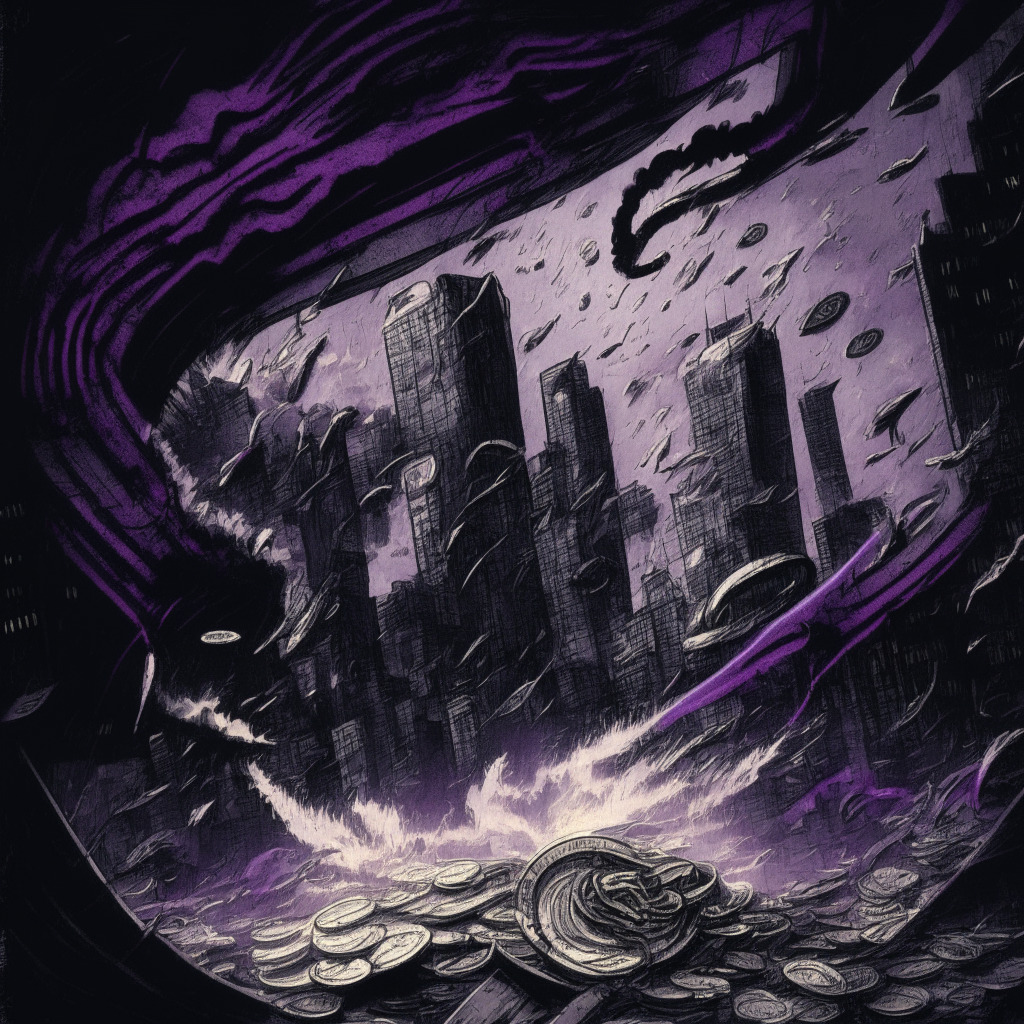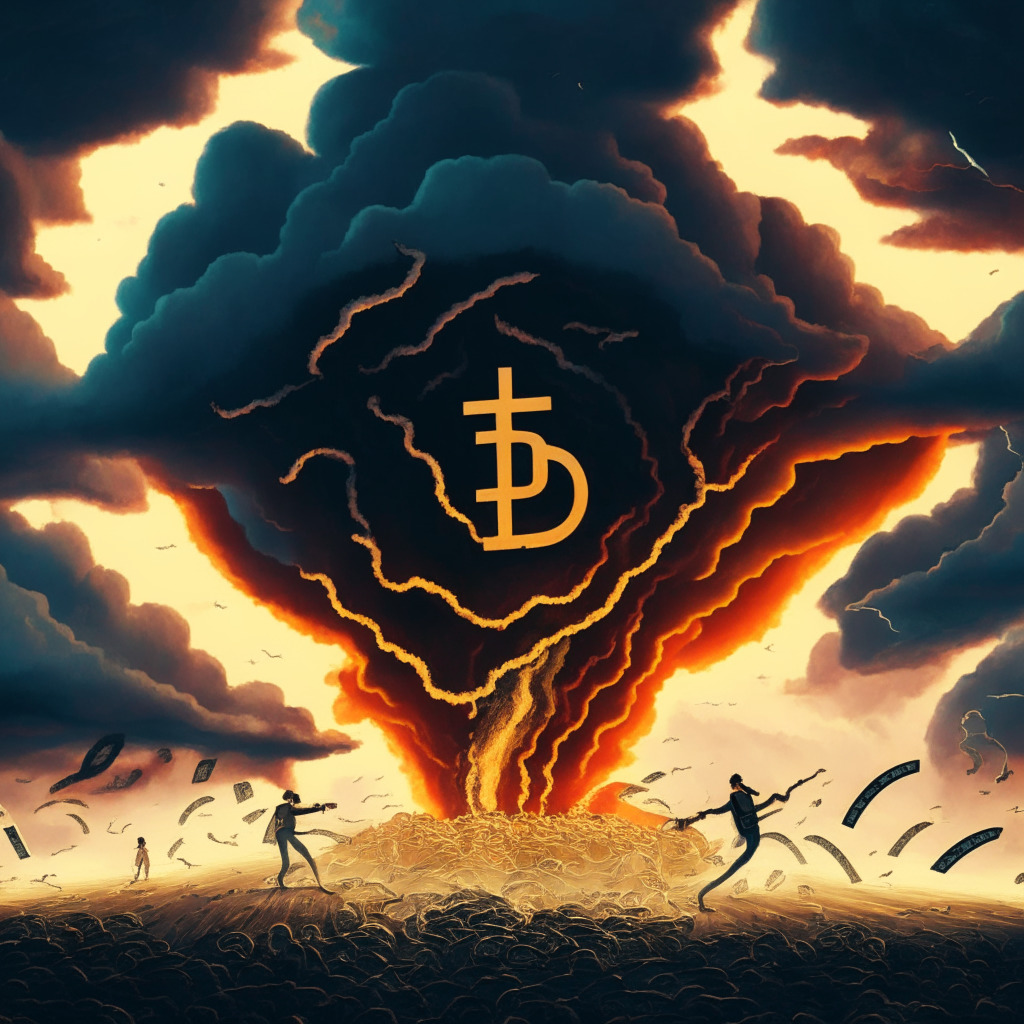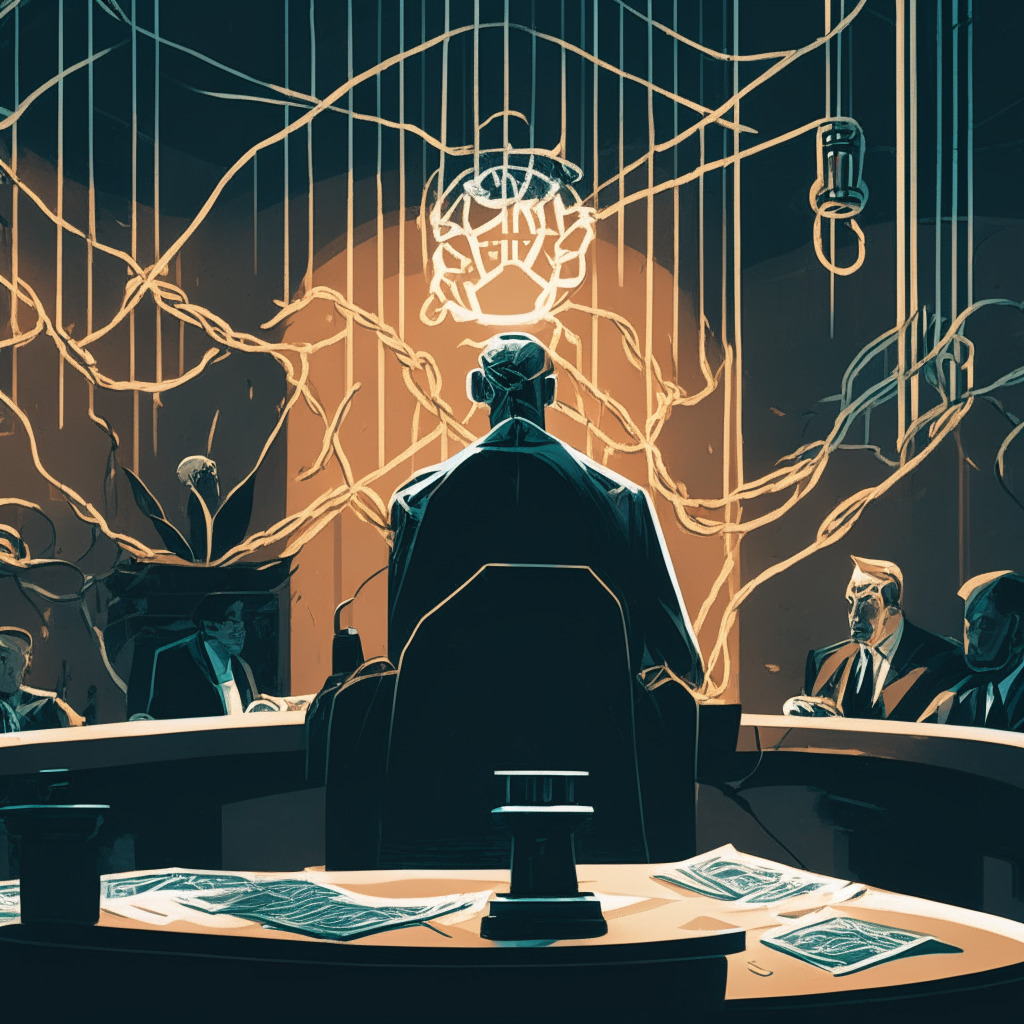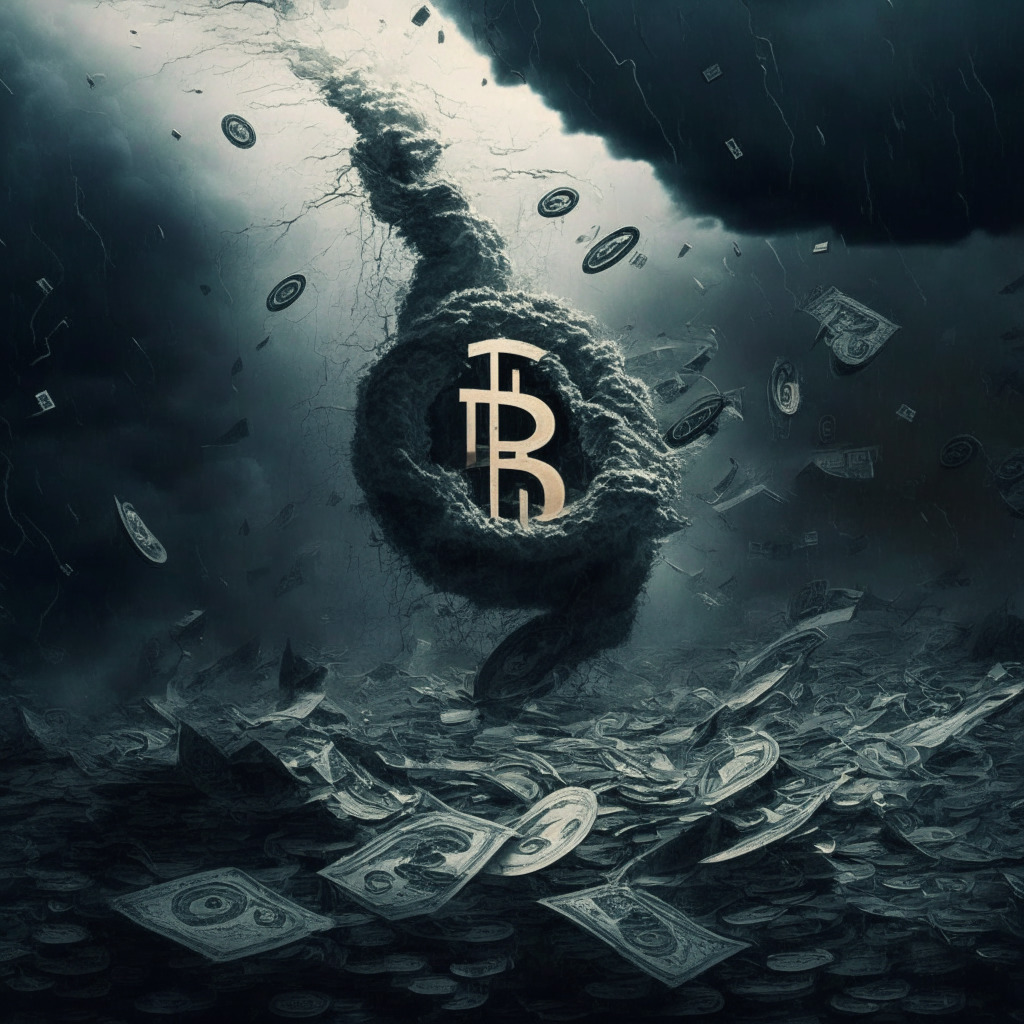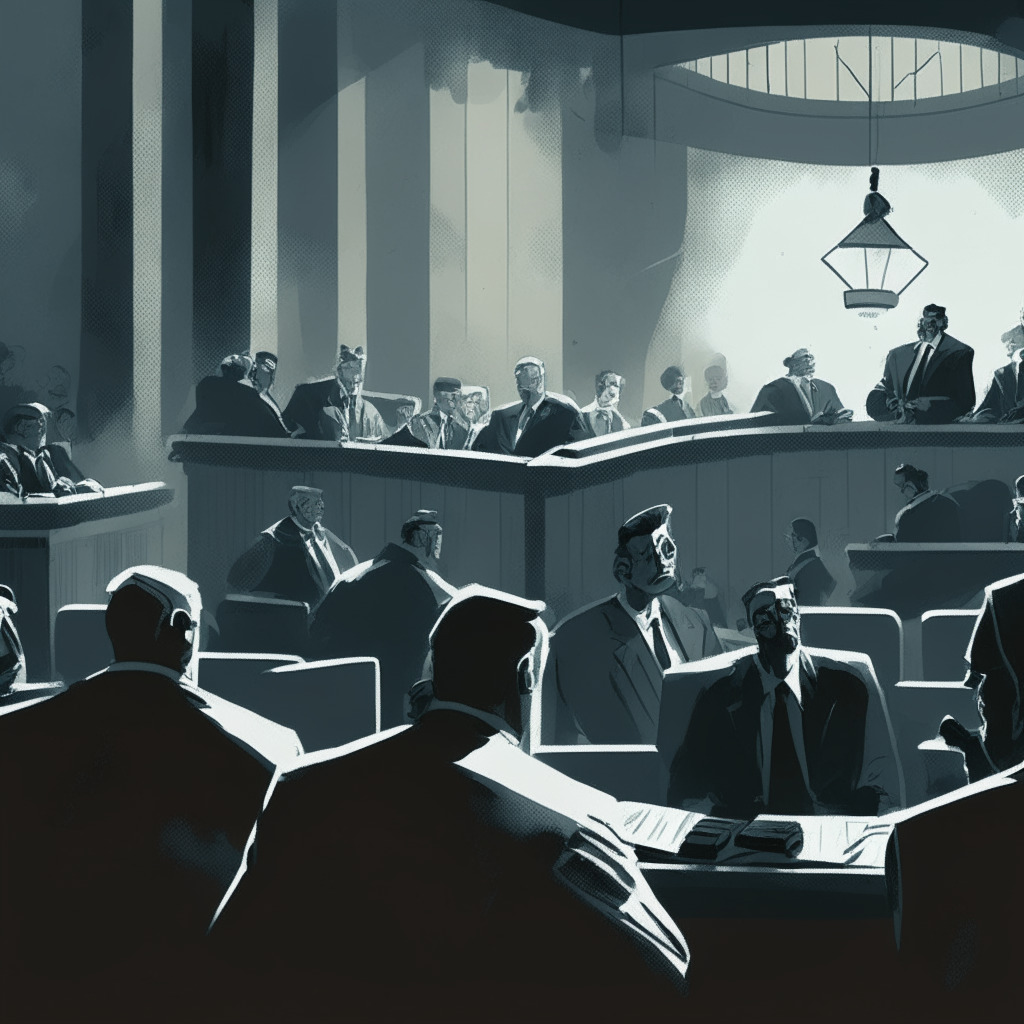Despite facing US Treasury Department sanctions in August 2022, Tornado Cash has reportedly circulated $77.35 million worth of assets on Ethereum mainnet over the last month, according to blockchain intelligence firm, Arkham. The US allegations pertain to the platform’s use by North Korean hacker group, Lazarus Group, for money laundering. After an initial slump, Tornado Cash’s current total volume locked stands at $187.9 million.
Search Results for: torn
Storm Brewing: Tornado Cash and the Controversy of Blockchain Legality
Co-founder of Ethereum-based “crypto mixer” Tornado Cash, Roman Storm faces severe charges including money laundering and sanctions violations. The charges are closely tied to Tornado Cash’s operations and the allegedly connected North Korean hacker group, Lazarus Group – further leading to international sanction violations complications.
Tornado Cash Developer Under Scrutiny: A Ripple Effect Through the Crypto Universe?
Roman Storm, a primary developer for Tornado Cash, faces court proceeding against accusations of facilitating illicit activities including large-scale money laundering using their crypto platform. The case yields an imperative question: could coding for privacy-enabled blockchain technology become a punishable offense?
Tornado Cash Indictments: Defining Moment for Crypto or Straightforward Crime?
The Tornado Cash indictments have raised concerns about the regulation of decentralized trading platforms. The co-founders are accused of enabling North Korea to launder crypto. However, these allegations point to monitoring fraudulent activities, not suppressing the industry. The focus is more on developer actions than setting a precedent for the entire cryptocurrency industry.
Crypto Controversies: Tornado Cash’s Legal Troubles, FTX Founder Behind Bars, and Huge Bitcoin Concentration
“The crypto industry is grappling with legal and ethical challenges, whilst showing high-risk, high-reward nature. With recent controversies involving Tornado Cash co-founders, FTX founder, and the parent company of Prime Trust, it’s clear that proper evaluation and risk-assessment are crucial.”
Tornado Cash Co-Founder Arrest and Debate on Developer Responsibility in Blockchain Regulation
Tornado Cash co-founder, Roman Storm, was arrested over money-laundering charges. The case has raised debates about responsibility and control within the blockchain industry, particularly for software developers. This controversy suggests that future blockchain regulation is navigating uncertain territory.
KYC Regulations vs Permissionless Money: The Crypto Crossroads Unveiled by Tornado Cash Crisis
“The recent arrest of Tornado Cash founders has raised questions about the coexistence of KYC regulations and permissionless money. With platforms like Bitcoin’s Lightning Network and MetaMask allowing near-traceless transactions, the intrusion of KYC challenges the decentralization and anonymity that cryptocurrencies offer. This situation brings the future of crypto at a crossroads between regulatory vigilance and sector’s initial ethos.”
Tornado Cash Controversy: Balancing Blockchain Privacy and Regulatory Oversight
The US Department of Justice has accused Tornado Cash’s developers of facilitating money laundering and sanctions violations through their Ethereum-based privacy protocol. This situation raises concerns over the delicate balance between financial privacy, integral to crypto and blockchain technology, and regulatory oversight to prevent illicit transactions. The outcome will significantly impact the future of blockchain development.
Tornado Cash Founders Charged: A Blow for Privacy or Triumph for Law Enforcement?
“Roman Storm and Roman Semenov, key figures of Tornado Cash, are facing charges for helping North Korea’s Lazarus Group launder over $1 billion via a privacy mixer. This incident sparks debate on blockchain privacy protections being exploited by criminals versus the potential shortfalls of legal jurisdiction in regulating such abuses.”
Decoding the Legal Matrix: Tornado Cash, DAOs, and the Future of Blockchain Oversight
A recent legal case saw a federal judge approving U.S. Treasury’s sanctions on Tornado Cash, a crypto tool allegedly used by North Korea for money laundering. The ruling, which validated an enforcement action against a Decentralized Autonomous Organization (DAO), sets a compelling precedent for DAOs’ future role in crypto projects.
Upholding Sanctions on Crypto Mixer Tornado Cash: A Regulatory Triumph or Freedom Infringement?
“A federal judge in Texas validated sanctions on Tornado Cash, a crypto mixing service, dismissing concerns that the Treasury Department overstepped their jurisdiction. This significant precedent for regulatory authority over crypto services underscores the need to balance user anonymity with oversight for illicit activities.”
Blockchain regulation: A deep dive into the Tornado Cash vs Treasury case and its implications
“The case underscores a delicate dynamic in the blockchain world – the continuous tussle between freedom and control, between decentralized finance and government intervention, each with weighty implications on the other. This case symbolizes a battle of principles, signaling a profound shift in the future of blockchain technology.”
CoinEx Settlement with NY Attorney General: Understanding the Impact on Crypto Exchanges and Investors
Hong Kong-based crypto exchange CoinEx faced a $1.7 million settlement with the New York Attorney General’s office due to failure to register as a securities and commodities broker-dealer. The settlement acts as a cautionary tale for crypto companies that don’t comply with New York laws, emphasizing the risks unregistered platforms pose to investors and the economy.
Balancing Financial Security and Privacy: The Tornado Cash Sanctions Debate
The Blockchain Association supports Coin Center’s lawsuit against the US Treasury over its sanctions against Tornado Cash, arguing that the sanction raises regulatory and constitutional concerns. The case outcome could set a precedent for privacy-protecting services in the digital asset industry, emphasizing the need to balance financial security and individual privacy.
Blockchain vs OFAC: Tornado Cash Sanctions Threaten Privacy and Innovation in Crypto World
The Blockchain Association has backed Coin Center’s lawsuit against the Treasury Department and OFAC, arguing that sanctions against Tornado Cash hinder Americans’ ability to transact privately on the Ethereum network. They stress that regulatory actions should target malicious actors, not technology, acknowledging the legitimate uses for privacy-enhancing tools like Tornado Cash. This lawsuit highlights the critical balance between innovation, privacy, and regulation in the evolving blockchain future.
Hacker Hijacks Tornado Cash, Launders Stolen Funds, and Returns Control: Exploring the Risks
The hacker who hijacked cryptocurrency mixer Tornado Cash returned control to its team, despite laundering stolen funds on the platform. This highlights the risks linked to privacy-enhanced solutions and Tornado Cash’s use by cybercriminals for hiding illicit transactions.
Binance Reopens TORN Deposits: Analyzing Security and Future Prospects in Decentralized Systems
Binance has reopened TORN deposits after a security breach on privacy-focused crypto mixer Tornado Cash DAO. Despite the hack, Tornado Cash’s protocol was not impacted, but concerns arise over potential risks and vulnerabilities in decentralized systems. Binance’s decisive actions, like monitoring projects, aim to ensure better stability and security.
Tornado Cash Regains Control: Attack, Recovery, and Future of DeFi Security
Tornado Cash’s governance token holders regain control over the protocol after an unexpected proposal by the individual responsible for a recent attack. This highlights continuous challenges faced by decentralized finance (DeFi) protocols in maintaining security and safeguarding against potential vulnerabilities.
Tornado Cash vs US Treasury: A Battle of Privacy, Sanctions, and Free Speech
The ongoing legal battle between individuals and the US Department of Treasury focuses on sanctioning Ethereum mixing service Tornado Cash. Key arguments involve adherence to the International Emergency Economic Powers Act and the First Amendment’s protection of free speech. Coinbase’s chief legal officer, Paul Grewal, claims the government is inappropriately banning open-source software.
Tornado Cash Lawsuit: Unraveling Complexities in Smart Contracts, Ownership, and Free Speech
A group of crypto engineers and investors are suing the U.S. Department of Treasury over sanctions against Tornado Cash’s privacy protocol, claiming violation of the International Emergency Economic Powers Act (IEEPA) and First Amendment rights. The lawsuit raises questions about property, unincorporated associations, and free speech in blockchain technology.
Tornado Cash DAO Takeover: Analyzing Risks, Governance, and Resilience in Decentralized Systems
The recent Tornado Cash DAO takeover brings attention to the vulnerability of decentralized autonomous organizations (DAOs) and the importance of proper governance to prevent malicious attacks. The privacy-focused Tornado Cash’s protocol remains intact, highlighting the need for an improved and secure DAO system to ensure protocol security and trust in blockchain technologies.
US Treasury vs Tornado Cash: Sanctions Overreach or Necessary Protection?
Six individuals using Tornado Cash argue that the US Treasury’s attempt to sanction the open-source platform violates their First Amendment rights and goes beyond government authority. They claim the platform’s purpose is to uphold user privacy, while skeptics associate it with nefarious activities like money laundering and terror financing. The outcome of this legal battle may impact future government intervention in the cryptocurrency market and personal investments.
Tornado Cash Developer vs Chainalysis: Balancing Blockchain Privacy, Legality & Innovation
In this article, Tornado Cash developer Alexey Pertsev has been granted permission to cross-question blockchain analytics company Chainalysis to clear his name of money laundering charges. The case raises important questions about the balance between technology innovation, privacy, legality, and regulation in the blockchain and cryptocurrencies realm.
Tornado Cash Attacker’s Surprising Move: Blockchain Security in Decentralized Systems Debated
The attacker of decentralized autonomous organization, Tornado Cash, submits a proposal to return control, sparking skepticism and optimism among crypto enthusiasts. The incident highlights the vulnerabilities and potential resilience of decentralized systems while emphasizing the importance of community-based approaches to mitigate risks and maintain trustless relationships in blockchain technology.
Tornado Cash Attack: Hacker’s Change of Heart Raises Questions on Trust and Blockchain Security
A new proposal surfaces to potentially restore Tornado Cash’s governance after a malicious attacker hijacked it. Quick action by community member Tornadosaurus Hex aimed to limit damage while the attacker surprisingly signaled intent to return governance control. This incident highlights the need for constant vigilance in blockchain cybersecurity.
Unexpected TORN Token Surge: Reversing Attack or Gigatroll Strategy?
Tornado Cash token (TORN) experienced a 10% increase after a proposal aiming to reverse malicious changes implemented by an attacker. The attacker’s proposal plans to restore governance state, with a good chance of execution. This incident emphasizes the importance of security and vigilance in the blockchain and cryptocurrency industry.
Tornado Cash DAO Breach: Analyzing Decentralized Governance and Security Challenges
A security breach at the decentralized autonomous organization (DAO) of Tornado Cash raised concerns as an attacker initiated a malicious proposal, gaining control over certain project aspects. This highlights the potential risks of decentralized management and emphasizes the importance of increased vigilance and robust security measures in ensuring a secure future for digital assets.
Governance Attack on Tornado Cash: Trust Eroded and Future Uncertain as TORN Price Plummets
A recent governance attack on crypto mixer Tornado Cash allowed attackers to gain full control, granting themselves 1.2 million votes through a malicious proposal. The attackers have been withdrawing TORN from the platform’s governance vault and trading it for Ethereum, causing TORN price to plummet 35% within 24 hours. Major crypto exchanges like Binance suspended TORN deposits as a precautionary measure.
Tornado Cash Governance Hijacked: Security Breach and the Fight to Regain Control
Decentralized crypto mixer Tornado Cash fell victim to an attacker who gained full control of its governance through a malicious proposal. The attacker’s control now poses risks to locked votes, tokens, and router functionality, emphasizing the need for investors to scrutinize proposals and prioritize safety in the evolving crypto landscape.
NY Attorney General’s Bold Crypto Regulation Act: Striking the Balance Between Protection and Innovation
The New York Attorney General, Letitia James, proposes the Crypto Regulation, Protection, Transparency and Oversight Act (CRPTO) during the state’s 2023 legislative session. Aimed at granting greater authority to impose regulations on the cryptocurrency industry, the act addresses fraud, provides clear definitions for “stablecoin,” and seeks balance between consumer protection and technological advancement.
Legal Battle: NY Attorney General vs. Celsius Network Founder – Unveiling the Crypto Risks
The New York State Attorney General filed a complaint against Celsius Network founder Alex Mashinsky, accusing him of defrauding investors and concealing the platform’s failing health. The legal battle highlights the importance of understanding crypto investment risks, regulatory challenges, and the necessity for regulatory bodies to adapt to the industry’s unique challenges.
Examining the Ongoing Legal Battle Involving FTX Co-Founder: Unraveling the Knotted Crypto World
The legal team of Sam Bankman-Fried, facing trial in a complex crypto case, is questioning the understanding of borrowings from FTX co-founder Gary Wang. Accused of masking funds for personal use, Bankman-Fried’s defense claims Wang believed his actions legal, backed by professional advice. The ties between FTX and Alameda Research, a key point in the lawsuit, have thrown light on unclear blockchain regulations and ambiguous areas in crypto dealing.







